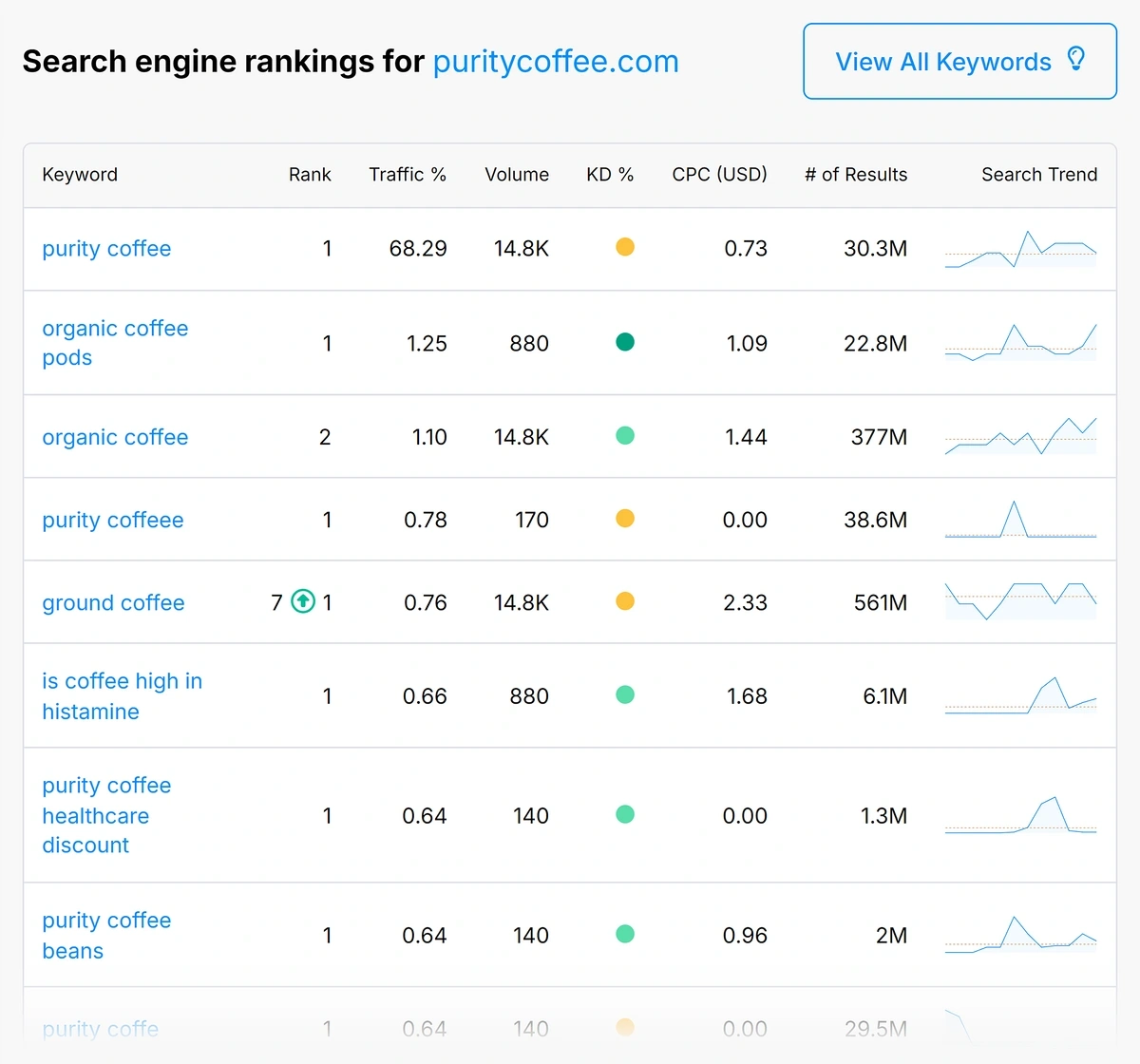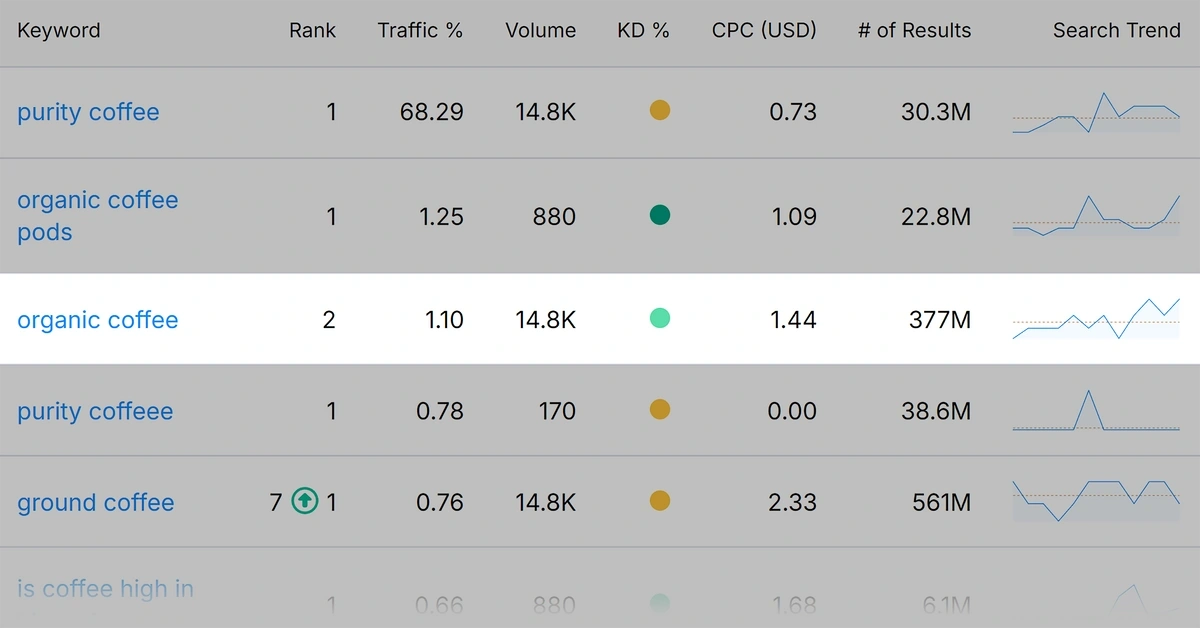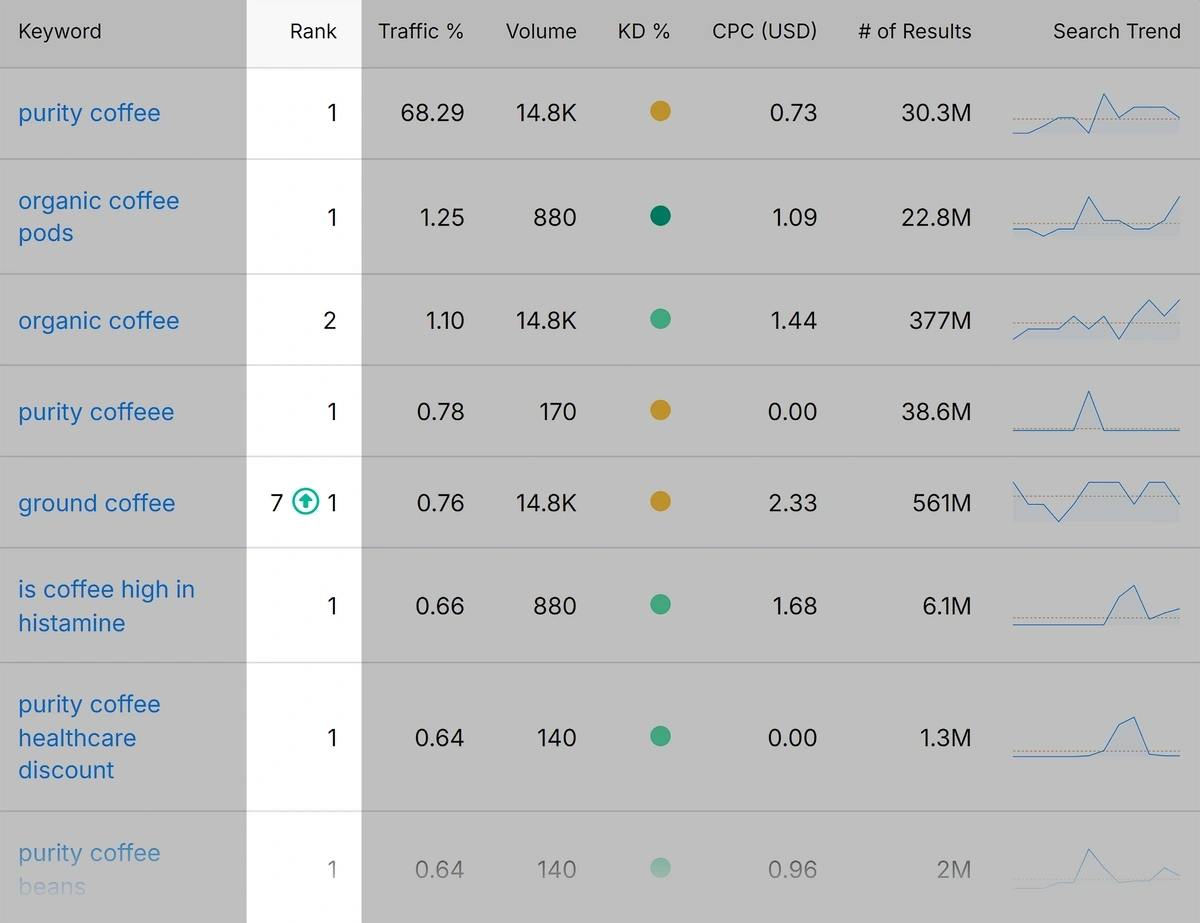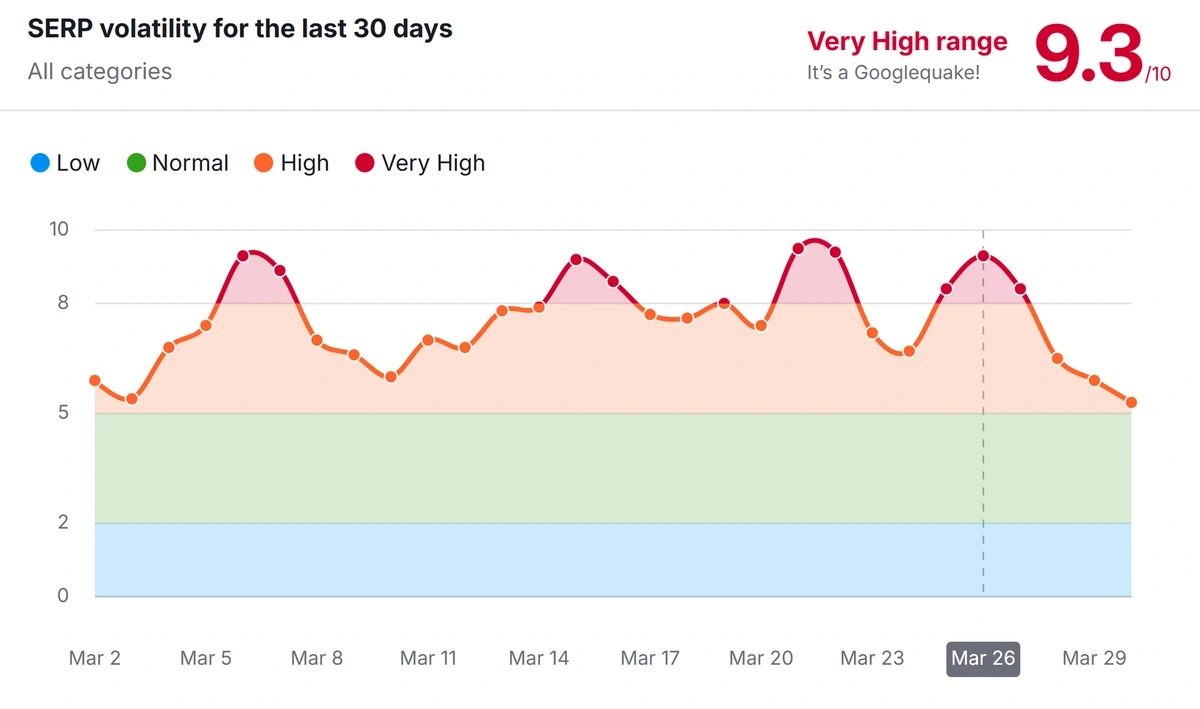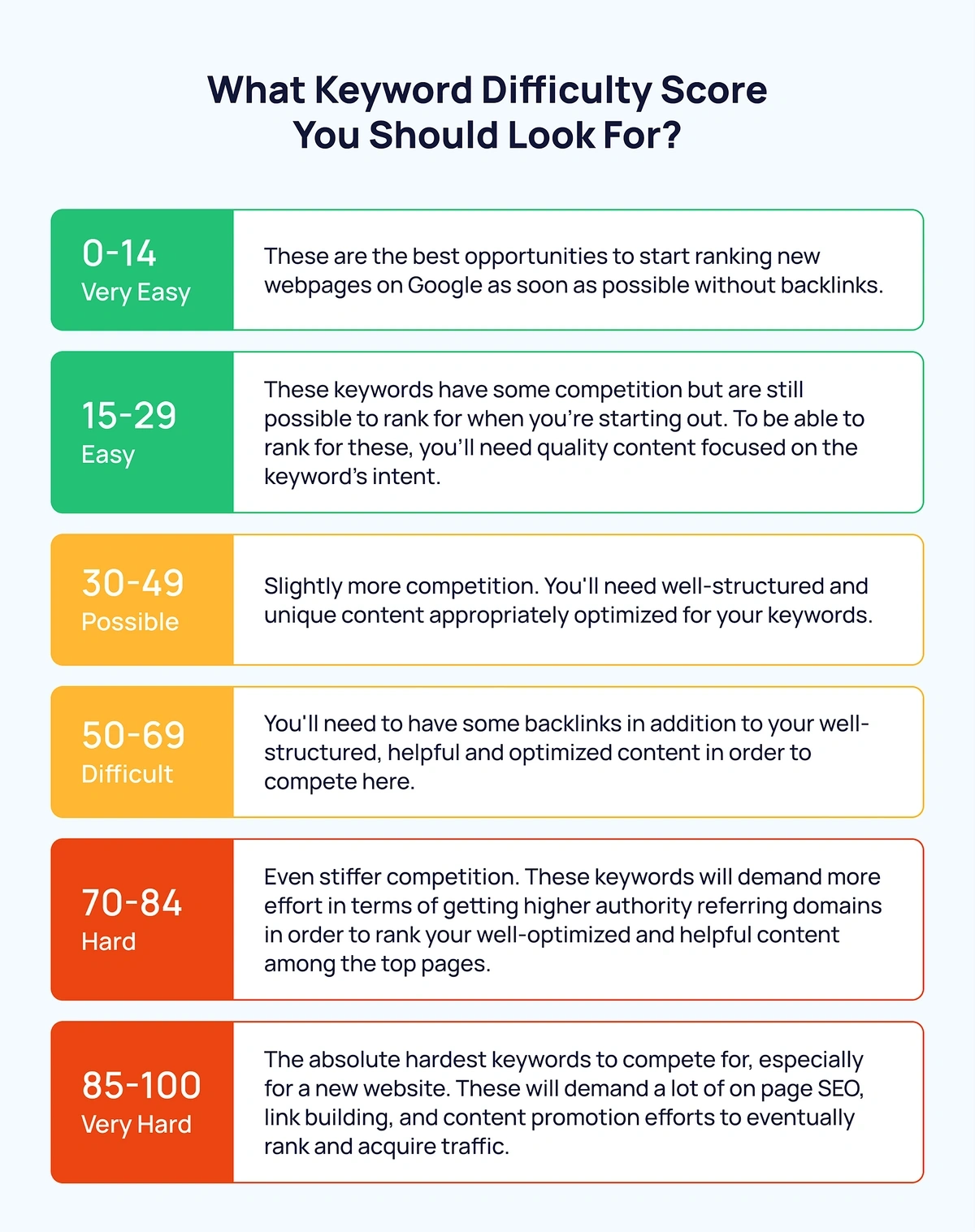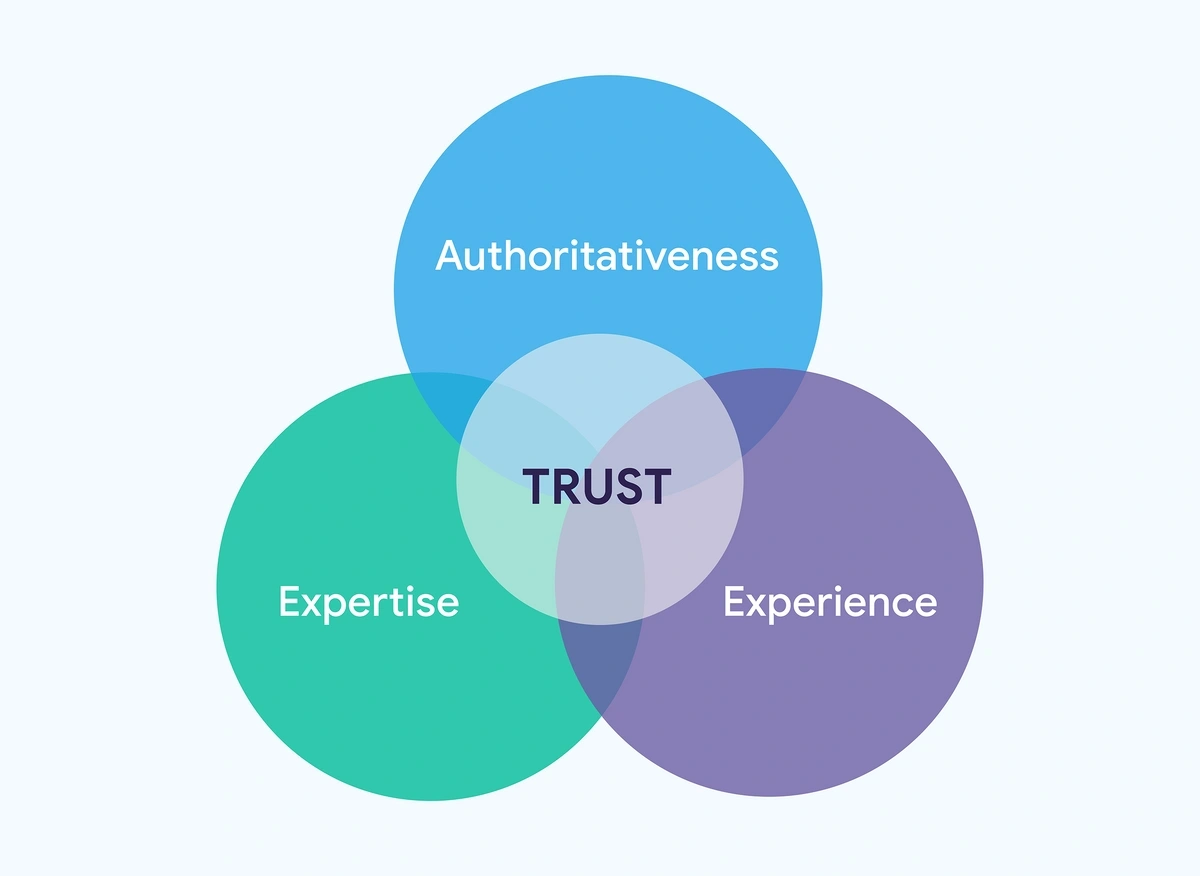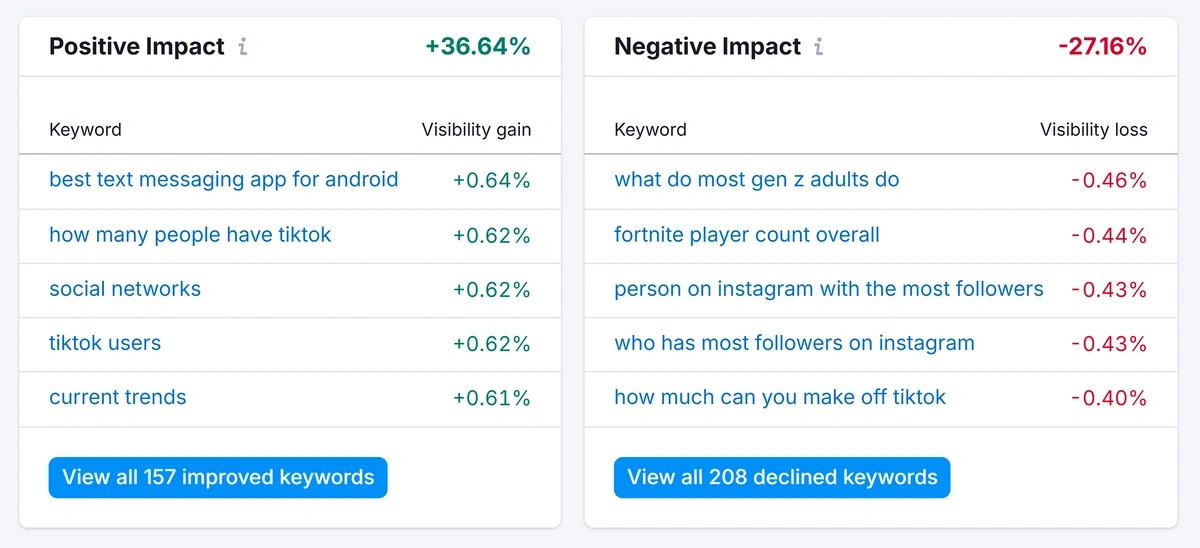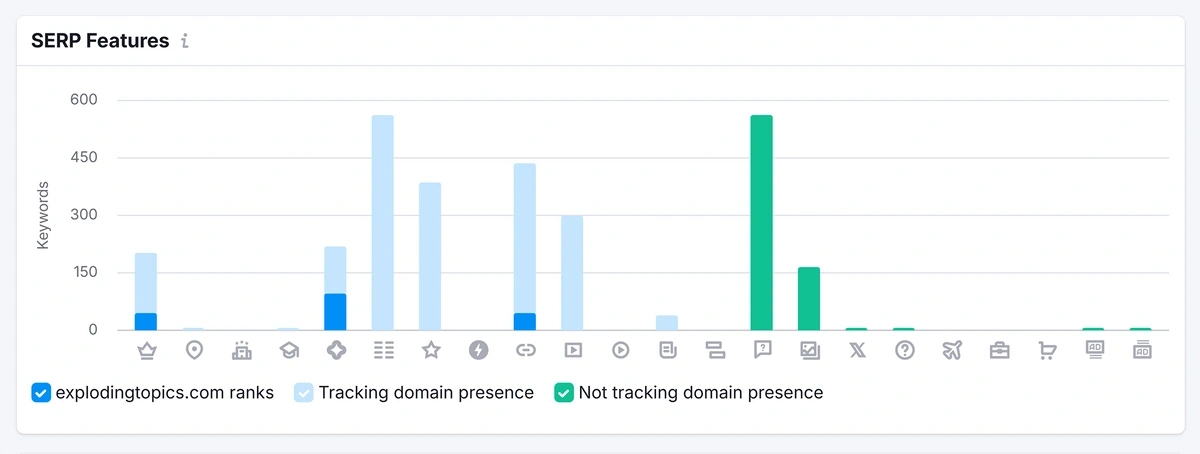Get Advanced Insights on Any Topic
Discover Trends 12+ Months Before Everyone Else
How We Find Trends Before They Take Off
Exploding Topics’ advanced algorithm monitors millions of unstructured data points to spot trends early on.

Keyword Research
Performance Tracking
Competitor Intelligence
Fix Your Site’s SEO Issues in 30 Seconds
Find technical issues blocking search visibility. Get prioritized, actionable fixes in seconds.
Powered by data from
Find Your Top Ranking Keywords on Google
Use our free Google Rank Checker to instantly find out which keywords your website is ranking for on Google, and exactly what position you hold for each one.
Enter any domain (your own or a competitor's) to get a full picture of its Google search rankings in seconds.
This tool provides a basic ranking check for free. All you need to do is enter your domain, and it will show you the latest ranking data for your keywords on Google.
There are two ways to use this free Google rank checker tool:
- Check your own Google position - see which keywords are driving traffic to your site, what position you hold for each one on Google, and how much of your overall traffic each keyword is responsible for.
- Research a competitor's Google rankings - enter any domain to see exactly where they rank on Google and discover the keywords they are winning.
With these insights, you can see what's exactly working for you and the discover new keyword opportunities that your competitors are capitalizing on.
This free online Google rank checker requires no installation or account, just enter a domain and your results are ready in seconds.
While signing up isn't needed, you can explore the data in greater detail for additional ranking keywords by creating a free Semrush account.
What Keywords Do I Rank For on Google?
Many people use it to answer a simple question: what keywords does my website currently rank for on Google?
When you enter your domain, the tool surfaces every Google keyword sending traffic to your site right now - including each keyword's search volume, your current Google ranking position, and the share of your total traffic that keyword is responsible for.
Why You Need to Check Your Google Rankings (and How Often)
Did you know that if you’re not on the first page of Google, 99+% of searchers will never see your site?
To make sure you’re getting valuable traffic, you’ll want to check your position in Google’s search engine results pages (SERPs) and fight for a spot on the first page.
Checking your Google search ranking regularly is the only way to know whether your SEO efforts are paying off.
Without monitoring your Google positions, you can't tell which pages are climbing, which have slipped, or where your biggest opportunities are hiding.
According to the latest SEO statistics, Google gets more than 90% of all search traffic.
Tools like ChatGPT don’t come close - at least, not yet.
And ranking on the first page is super important.
- 54% of all clicks go to the first 3 Google search results
- Just 0.44% of searchers visit the second page
As a first step, I recommend checking your current positions using the tool at the top of this page. All SEO begins from
How often should I check my rankings? For most sites, once a week is enough. You get a clear view of the overall trend without getting distracted by normal daily fluctuations. Our free Google ranking checker makes it easy to run a quick check whenever you need it.
How to Use Our Free Google Rank Checker Tool: Step-by-Step Guide
First, scroll up to our free keyword rank checker at the top of this page.
Enter your website domain (or a competitor's domain) and click “View Rankings".
Review your results to see which SEO keywords are currently driving traffic to your site.
These may not be the keywords you expected - but don’t panic.
Let’s run through the columns.
Keyword, Rank, and Traffic %
The Keyword column in the Google rank checker shows you the keywords that are driving the most traffic.
Our Google rank checker tool estimates the amount of traffic that each keyword is responsible for, which is displayed in the “Traffic %” column.
Here’s an example of a coffee retailer whose brand name drives more than 68% of its traffic.
This site also gets 1.1% from the commercial keyword “organic coffee”.
Commercial keywords, like a brand name, satisfy searchers who are looking to research products. "Organic coffee" is also a commercial keyword since searchers tend to be looking for a product to buy.
Our free keyword checker doesn’t show you the search intent, but a free Semrush account will provide you that information, so it’s worth signing up to verify the intent.
The “Rank” column shows you the current ranking position in the Google results when someone searches for the keyword.
You can think of the Rank column as your Google position checker, it tells you exactly where your page appears on Google when someone searches for that keyword.
Remember: the vast majority of search engine traffic goes to positions 1-3. (That means the first, second, and third result, once you scroll past the ads and AI overviews in the search results.)
If you see an arrow next to your ranking, it indicates that there has been a recent change. Green arrows show improvement in the keyword rank, and red arrows represent a decline.
What if rankings suddenly drop? If you see a red arrow, it indicates your rankings dropped on Google. Don't panic! Remember that Google’s systems constantly make small adjustments to rankings.
Your site could move up and down from one day to the next, based on things like how people are engaging with your site.
That’s why there’s no need to check your rankings every day in most cases.
Seeing a consistent fall in your position? If the drop is significant, and gets worse over a few weeks:
- Run a Site Audit in Semrush and see if there are any new technical issues with your site
- Check Semrush Sensor to see if there’s a Google update happening
- Google the keyword and read the content in positions 1-3: have your competitors updated or improved it recently?
SEO isn’t an exact science. There are a ton of moving parts. The trick is to understand why the drop happened so you can course-correct.
Volume and Search Trend
“Volume” is a measure of how many times a keyword is searched for in an average month.
Keep in mind that search volume is an estimated value. (I’ve targeted keywords with a volume of “0” and still generated traffic that converted well.)
You can get more clues from the “Search Trend” charts at the end of each row. These charts show you how the volume is changing - super helpful when tracking seasonal keywords and trending topics.
KD % and CPC
These two metrics indicate how much competition you have.
First, “KD %” stands for keyword difficulty percentage. This metric is most useful for small sites that are still building organic traffic (which means traffic from Google and other search engines).
While starting SEO as a beginner, it’s usually best to focus on low difficulty keywords.
Low difficulty and high volume is the ideal combination.
It can be difficult to find keywords with those characteristics. They are out there, though, and you can use this free keyword difficulty checker to find them.
Moving on, “CPC” stands for cost-per-click. It’s a metric most used in search engine marketing.
The cost-per-click is the amount you would have to pay for a click if you ran ads for that keyword. (The more people are competing for it, the higher the cost.)
While CPC isn’t an SEO metric, it can be handy to know which keywords are attracting the highest bids. This indicates there are brands competing for the traffic from that keyword and consider it to be worth paying for.
# of Results
Number of results is a simple metric that shows you how many results show in Google’s results when you search for the keyword.
Take this with a pinch of salt!
Semrush is very accurate overall, but the number of websites, web pages, and domains is constantly changing. The number of results column just gives you a general idea of what you’re up against.
Want to Spy on Your Competition?
Explore competitors’ website traffic stats, discover growth points, and expand your market share.
How to Improve Your Google Ranking: A Beginner's Strategy
The primary goal of all SEO is to rank as high as possible on Google. This is what gets you to those top spots:
1. Find the Right Keywords
Before you can rank higher on Google, you need to decide the specific keywords to target. The first step is getting into the head of a customer and ‘speaking their language’.
What would your ideal customer search for if they needed your services?
If you’re stuck, there is an easy way to take a shortcut.
Use the rank checker (top of this page) to check a competing website. See what they rank for.
That can kick-start your brainstorming process.
The actual keyword itself isn’t the only factor. If you’re a beginner in SEO, it’s best to target keywords with lower difficulty first.
For example, specific phrases like "affordable plumber in Chicago" are easier to rank for and more targeted than just "plumber".
2. Create Quality Content That Answers Questions
Google wants to show users the most helpful content.
Professionals who write and edit a ton of content (like me) hear this phrase all the time. But what does ‘helpful’ actually mean?
Google has a set of standards for its quality for reviewers to follow when assigning a Page Quality (PQ) rating. It’s called the Quality Rater’s Guidelines. And it reveals precisely what Google is looking for in a high quality web page.
The QRG says:
“High quality main content should be satisfying for people visiting the page. High quality main content shows evidence of effort, originality, talent, or skill. For informational pages, High quality main content must be accurate and consistent with well-established expert consensus when such consensus exists.”
So it’s clear that you need to:
- Answer the searcher’s question
- Put a decent amount of effort into creating the page
- Make it original and unique
- Demonstrate talent and skill
- Ensure the content is accurate
- Ensure it is consistent with expert consensus (in other words, no controversial clickbait or harmful advice)
The guidelines also state that you should not rely heavily on AI-generated content as a fast way to produce large amounts of content. It might indicate a lack of effort. The QRG says:
“The Lowest rating applies if all or almost all of the main content on the page (including text, images, audio, videos, etc) is copied, paraphrased, embedded, auto or AI generated, or reposted from other sources with little to no effort, little to no originality, and little to no added value for visitors to the website.”
Google also wants to see that your business is directly connected to the type of content that you create. Writing content around a specific topic, or niche, is called building topical authority.
And to demonstrate that your business knows its stuff, you’ll need to show evidence of EEAT.
EEAT stands for expertise, experience, authoritativeness, and trust. Google has created a diagram to explain how trust is supported by the other three factors.
If your content creators are experienced, have known qualifications, or can prove their expertise in another way, people will trust what they say.
For example, a nutritionist who writes about fitness topics is likely to be considered a trusted source of information about supplements.
3. Optimize Your Page for Search Engines
It would be great if you could write interesting content and instantly achieve a great ranking position.
But quality is not enough on its own.
Once you have good content, make sure Google can understand it. Optimization is the final step in the process.
- Make your topic clear in the title and make sure your content answers the searcher’s question
- Use a logical structure with useful headings, so people can find what they need
- Include semantic keywords if they support the core information on the page
- Link to helpful resources on your site, so people can find them easily
Content optimization is a big topic. These are just the basics. We’ve got more tips in this guide to improving on page SEO.
Once you’re happy that you’ve optimized your content, go ahead and publish it.
How long does it take to rank on Google? For new websites, it typically takes 3-6 months to start ranking for less competitive keywords. For more competitive terms, it can take 12+ months of consistent effort to achieve a good keyword ranking position.
4. Update Content Regularly
Content that's outdated loses rankings over time.
There can be many reasons for this, and I touched on some earlier:
- Google’s core updates can change rankings significantly
- Competitors might copy your keywords to push your position on Google down
- The intent behind search queries can change
- Content becomes less relevant as it gets older
To combat this, you can:
- Add new information to existing articles
- Replace outdated statistics with current data
- Expand your content to cover topics more thoroughly
- Fix broken links and outdated information
Content updates should be part of your SEO maintenance strategy. For more information, you can check out our guide to content audits, which includes a free template.
5. Track Keyword Rankings Over Time
While I don't recommend checking your rankings every day, you still need to keep a pulse on your search presence to make sure you're able to act fast if your keywords start dropping.
At the same time, rank tracking helps you stay informed about the keywords that are rising on Google for you, so you know exactly what's working and what isn't.
But rank tracking is continuous process. As a result, it's beyond the scope of free tools that can only perform a basic rank check for your domain when prompted.
Instead, you'll for long-term SEO planning, you need paid tools to monitor your search performance.
The Semrush Position Tracking tool is perfect for this. It tracks your positions on Google comprehensively.
In addition to positions, Semrush also gives you a clear picture about the SERP features like AI Overviews and featured snippets that you're currently occupying.
You can also track your rankings in Google AI Mode and AI tools like ChatGPT.
With automatic tracking across the board, I find that it greatly enhances my ability to spot underperforming keywords that I can boost back to the top with a careful content update.
At the same time, I can find my best keywords and optimize them for conversions.
The pages with the highest visibility give you the best chance for converting that traffic into paying customers, so don't hesitate to experiment with adding conversion elements.
More Free SEO Tools to Check and Improve Your Google Position
Hopefully, you’ve learned how our Google rank checker can help you to get more traffic to your site, so let’s clear up a few questions before I wrap up.
Do I need to pay to rank on Google?
No, you don’t need to pay to rank on Google. You can pay for Google Ads; they appear at the top of results. But organic rankings come from creating helpful content and following a good SEO strategy.
How do I check my website's Google position for free?
Use the free Google rank checker at the top of this page.
Enter your domain and it will show you which keywords your site ranks for on Google, along with each keyword's current position, search volume, and traffic share.
No account or payment needed to get started.
Is this a real-time Google rank checker?
The tool reflects the latest available ranking data from Semrush's database, which is updated regularly.
For most sites, the data is current enough to give you an accurate picture of your Google positions.
If you need daily automated tracking with real-time alerts, Semrush Position Tracking offers continuous monitoring.
What free tools can I use to improve my position on Google?
Fortunately, there are a ton. Here are some I recommend you start with:
- Semrush free SEO tools: links to a suite of super helpful SEO tools that are free to use
- Keyword Tool: generate 750+ free keyword suggestions from Google Autocomplete and other platforms
- AlsoAsked: Research People Also Asked questions for 3 keywords every day
That said, don’t sign up for a bunch of tools that will overwhelm you. Remember these key SEO tips:
- Our free Google rank checker will show you where you stand, so be sure to bookmark it before leaving
- If you create content that answers people's questions, you’re already halfway to improving your position on Google
- Optimize your content and update it periodically - don’t expect it to rank without fine-tuning
From here, I recommend these additional SEO resources for beginners who want to rank on Google:
- Our SEO copywriting checklist
- A list of the best SEO newsletters for up-to-date tips and techniques
- This free trial of paid Semrush tools
Stop Guessing, Start Growing 🚀
Use real-time topic data to create content that resonates and brings results.
Exploding Topics is owned by Semrush. Our mission is to provide accurate data and expert insights on emerging trends. Unless otherwise noted, this page’s content was written by either an employee or a paid contractor of Semrush Inc.
Share
Newsletter Signup
By clicking “Subscribe” you agree to Semrush Privacy Policy and consent to Semrush using your contact data for newsletter purposes



